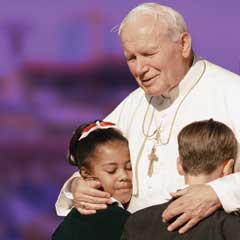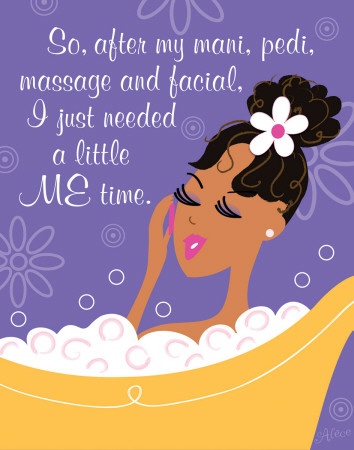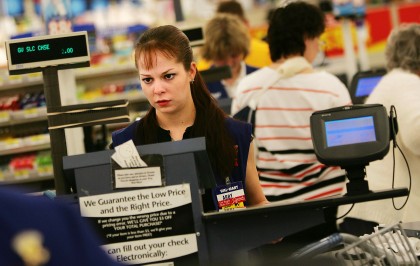Becoming Who You Are, Even If You’re Not Sure Who That Is
Devra Torres | Aug 27, 2014 | 7 cmts

“Become who you are!” St. John Paul II used to encourage us. I loved that. But I ran into a problem: how to figure out what, or who, that was?
People have different ideas on how to go about this. One popular approach is to strip away all your roles. Once you’ve shed all that extraneous stuff, you’ll be able to see what lies beneath it. You’ll be free, the theory goes, to become who you really are.
Well, that depends: what do we mean by “roles”? There are lots of possibilities, but here are four, for starters:
SOCIAL CONSTRUCTS
One meaning of "role" is all the “socially constructed” aspects of you. They’re not part of who you “really” are, but they’re so deeply embedded in you, you can’t tell the difference. The culture has been telling you they’re part of your very self—but they’re not! Once you realize that, you’re free!
This idea is critiqued in Maggie Gallagher’s 1989 book, Enemies of Eros. Her target is a certain kind of feminism which assumes that if you peel back all the layers—the stereotypes, the expectations, all the socially constructed elements—like your gender—you’ll unearth the “secret Self."
Underneath all those social, religious, and cultural expectations lies the real person. Wifehood, motherhood, womanhood, faith—they all need to be stripped away. It’s hard to say what, exactly, is left, but whatever it is, that's the pure, unencumbered Self.
RELATIONSHIPS
When some people urge the importance of breaking free of roles, what they really mean is breaking free of other persons. To find out who you really are, you might need to desert your wife, your husband, or your children.
This has led to all kinds of sad, ‘70’s-style scenarios of people abandoning their families out of a terribly misplaced and confused sense of a duty to “find themselves.” At least, some sincerely saw it as a duty. For others, it was more of a pretext. They all talked as if relationships—even when freely entered into—were no part of who you really were. They had no sense of John Paul’s insight into discovering, or becoming, who you are through the experience of a communion of persons.

A more benign expression of this idea is the idolization of “Me time.” It can easily get out of hand, as Bethany Baird writes here, and needs to be rightly understood and integrated into the midst of life with other human beings, not greedily hoarded, as Lydia points out here. Otherwise, in trying to break free from roles, while you don’t abandon your husband and children, you see them as a hindrance, a work environment from which you’re absolutely entitled to a certain amount of time off.

FUNCTIONS
A role can also just be a function: a job I do. I might play the role of a Vice President of Marketing, or a cashier at the 7-Eleven. Neither one necessarily has anything to do with who I really am. Behind the timeworn question, “What do you want to be when you grow up?” lurks a disquieting presumption: you are your job. If you don’t have one, or a sufficiently impressive one, you don’t count.

I make a point of not asking my kids what they want to be when they grow up, at least not in a way that insinuates that their personhood depends on their resume, but I do try to instill the idea that they’re meant to do some very particular thing, play some very personal, particular role, that only they can play. They won't get closer to authentic selfhood by staring at YouTube all day, hoping no one asks them to set the table or practice the piano.
VOCATIONS
What if your role is your vocation? This can lead to confusion, too. I don’t mean “vocation” in the narrow sense of a calling to religious life. I’m thinking of a recent Facebook conversation with someone who feels called to work in a certain field but can’t get hired, someone else who feels called to study for a certain degree but can’t get accepted into a program. What if your calling just isn’t possible? Maybe you’re just fooling yourself, or maybe you’re giving up too easily. But what about when your “calling” ends up far, far removed from the life you’re actually living? How are you supposed to "become who you are" when your attempts are thwarted at every turn?
There are grains of truth in our misguided and fumbling attempts to figure it all out. "Self-realization" is one of those words that's been overused and abused beyond recognition. But that's no reason to reject the real thing and ignore John Paul's advice.


Comments (7)
Kate Whittaker Cousino
Aug 28, 2014 1:40pm
Sometimes I think that the "who you are" in "become who you are" refers to our acting and being--which are inalienable, really. So it's not really that we can ever be not ourselves, but we are less than fully ourselves when we abdicate responsibility for our actions, when we re-act rather than act, when we choose by failing to choose.
Which mean, I guess, that I am as fully myself in relationship as I am in a role or function, so long as I am fully present to the choices and persons around me, and fully choose to act out of my own gifts, abilities, and call to virtue. If I use a social construct, relationship, function, or even a 'vocation' as a prop, a layer of insulation against the terrible call to own my own actions and respond rightly to the goods around me, then they can be obstacles to my full development as "who I am."
I remember when Jen Fulwiler wrote about realizing that the best 'me time' is the kind that reinvigorates--which tends to be active: creation, exercise, service, self-development. These are responses to the goods in ourselves, the world, and others.
Katie van Schaijik
Aug 29, 2014 9:43am
I like what you say here, Kate.
As someone who has had a lot to learn about personal authenticity, I have more sympathy (I think) than a lot of conservative Catholics—certainly more than I used to have myself—for the contemporary ways of talking about about the self.
I mean, I understand now in ways I didn't used to, for instance, that "me time" is something I need. I used to scorn the idea as selfish. "All of me and my time belongs to God and my husband and children." I didn't understand that this was a neglect of my own humanity.
I had to learn not to be driven by my "role" as wife and mother, and so on. I hadn't realized how alienated from myself I was, and how artificial many of my ideas of what I ought to do and be were.
I had to learn to "taken possession of the land" that is my self—take responsibility for my thoughts, feelings, acts, limits, etc.
Part of this entailed a discovery that some of my relationships weren't real.
I'm still learning.
Devra Torres
Aug 29, 2014 10:19am
Kate, yes, I was always struck by Karol Wojtyla's distinction between humanl acts and "acts of man": acts that emerge from your free center, and things that you do but that are just physiological or instinctive or reactive--acts that are "automatic" in some way, and don't fully involve your freedom.
The feminist ideas that Maggie Gallagher was writing against did have a large grain of truth. As we've been talking about here lately from many angles, for a long time, there definitely are people and relationships and cultures and mentalities that you do have to separate yourself from to find out who you even are, and to initiate action that really comes from your own free center.
Where many people go wrong, it seems, is in seeing the core of each person as totally unrelated to relations with other subjects. It's as if they think: if it's a relationship, it's not a reality, but just something that's "in your head" or something that belongs to the realm of feelings, understood in the most superficial and reductive sense.
Katie van Schaijik
Aug 29, 2014 10:30am
Do you think anyone really believes that?
Maybe I live in a bubble. But I know lots of people who think being Catholic (for instance) means "you have to stay in relationships" and that all concern for authenticity is a modernist cover for egocentrism, that annulments are nothing but ephemisms for divorce, and that if you're a mother it means that you "role" is to be a fulltime housewife, and so on and so forth.
I haven't met anyone who thinks we don't need relationships.
I know they're out there, but I don't come across them.
Sam Roeble
Aug 29, 2014 10:40am
I highly recommend Thomas Dubay's Authenticity as further reading for this post.
Devra Torres
Aug 29, 2014 10:54am
No, just about everyone knows we need relationships. I will be thinking about how to express what I'm trying to say more clearly as I take care of some urgent things around here, because I want to do this discussion more justice than I can right now. Bis bald!
Devra Torres
Sep 7, 2014 1:08pm
Katie, I was thinking more of people who value relationships but want to claim absolute authority over how much they encroach on the self--like people who marry "as long as we both shall love" or a man who fathers a baby but reserves the right to ignore it from then on. They value relationships, but they don't grant that once you (validly) marry, from then on you are that person's spouse, or once you've procreated, you are a mother or father. It changes you ontologically. Who you are is not separate from who certain relationships have constituted you to be. Does that make sense?
Of course this is not to say that mothers may not work outside the home, or that annulmnets or separation or civil divorce may not be necessary. It's not to reduce the person to a certain, narrow understanding of what a wife or mother or father is supposed to be. It's not to deny the person's legitimate autonomy.